MENU
The Electronic Scholarly Publishing Project: Providing access to classic scientific papers and other scholarly materials, since 1993. More About: ESP | OUR CONTENT | THIS WEBSITE | WHAT'S NEW | WHAT'S HOT
Comparative Timelines
The ESP Timeline (one of the site's most popular features) has been completely updated to allow the user to select (using the timeline controls above each column) different topics for the left and right sides of the display.
Select:
New Left Column
New Left Column
Dates
Decade
New Right Column
New Right Column
(no entry for this year)
1980
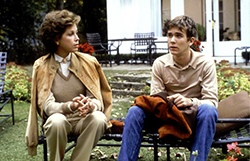 Ordinary People wins Academy Award for best picture. Robert Redford's directing debut won at the National Board of Review, the N.Y. Film Critics Circle, Golden Globes, the Writers and Directors guilds, and then four Oscars, out of six nominations.
Ordinary People wins Academy Award for best picture. Robert Redford's directing debut won at the National Board of Review, the N.Y. Film Critics Circle, Golden Globes, the Writers and Directors guilds, and then four Oscars, out of six nominations.
(no entry for this year)
1981
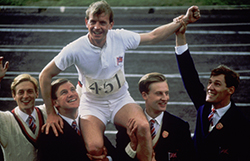 Chariots of Fire wins Academy Award for best picture. The tale of the 1924 Olympics proved one of the biggest surprises in Oscar history, though a popular choice; most pundits had predicted it would be a showdown between Warren Beatty's epic Reds and the small-scale family drama On Golden Pond.
Chariots of Fire wins Academy Award for best picture. The tale of the 1924 Olympics proved one of the biggest surprises in Oscar history, though a popular choice; most pundits had predicted it would be a showdown between Warren Beatty's epic Reds and the small-scale family drama On Golden Pond.
(no entry for this year)
1982
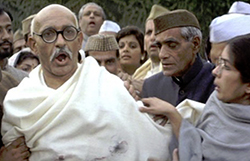 Gandhi wins Academy Award for best picture. There was a lot of competition that year, including E.T. the ExtraTerrestrial and Tootsie. But the grand-scale biopic from director Richard Attenborough was the evening's big winner, with eight trophies.
Gandhi wins Academy Award for best picture. There was a lot of competition that year, including E.T. the ExtraTerrestrial and Tootsie. But the grand-scale biopic from director Richard Attenborough was the evening's big winner, with eight trophies.
On November 2, Pres. Ronald Reagan signs into law a bill making the third Monday in January a federal holiday honoring the life of Martin Luther King Jr.
1983
 Terms of Endearment wins Academy Award for best picture. TV's James L. Brooks made a splashy film debut, winning three personal awards that night (as writer, director, and producer), while Shirley MacLaine and Jack Nicholson also took home acting prizes.
Terms of Endearment wins Academy Award for best picture. TV's James L. Brooks made a splashy film debut, winning three personal awards that night (as writer, director, and producer), while Shirley MacLaine and Jack Nicholson also took home acting prizes.
(no entry for this year)
1984
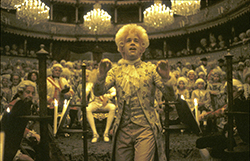 Amadeus wins Academy Award for best picture. Milos Forman's sumptuous version of Peter Shaffer's stage play scored eight wins out of 11 nominations.
Amadeus wins Academy Award for best picture. Milos Forman's sumptuous version of Peter Shaffer's stage play scored eight wins out of 11 nominations.
United States Rep. William H. Gray III (Pennsylvania), becomes the first African-American congressmen to chair the House Budget Committee.
1985
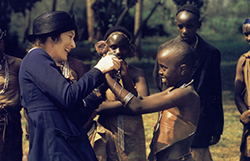 Out of Africa wins Academy Award for best picture. The epic romance benefited from Meryl Streep's performance, Sydney Pollack's direction and Kurt Luedtke's adaptation of Isak Dinesen's book. In all, the film won seven Oscars (though Streep was an also-ran).
Out of Africa wins Academy Award for best picture. The epic romance benefited from Meryl Streep's performance, Sydney Pollack's direction and Kurt Luedtke's adaptation of Isak Dinesen's book. In all, the film won seven Oscars (though Streep was an also-ran).
On September 8, The Oprah Winfrey Show from Chicago becomes nationally syndicated.
1986
 Platoon wins Academy Award for best picture. Oliver Stone's autobiographical film, a vivid account of his Vietnam experiences, won four Oscars, including Stone as director.
Platoon wins Academy Award for best picture. Oliver Stone's autobiographical film, a vivid account of his Vietnam experiences, won four Oscars, including Stone as director.
 Dr. Clifton R. Wharton Jr. is appointed chairman and CEO of TIAA-CREF, the 19th largest US Fortune 500 company. He becomes the first black chairman and CEO of a major US corporation.
Dr. Clifton R. Wharton Jr. is appointed chairman and CEO of TIAA-CREF, the 19th largest US Fortune 500 company. He becomes the first black chairman and CEO of a major US corporation.
 Kurt Schmoke becomes the first African-American elected mayor of Baltimore.
Kurt Schmoke becomes the first African-American elected mayor of Baltimore.
1987
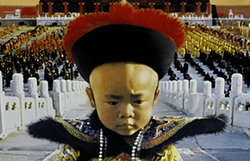 The Last Emperor wins Academy Award for best picture. The Bernardo Bertolucci-directed biopic scored a clean sweep: Nine wins out of nine nominations, the first time that happened since Gigi. The winners included Vittorio Storaro for his beautiful cinematography.
The Last Emperor wins Academy Award for best picture. The Bernardo Bertolucci-directed biopic scored a clean sweep: Nine wins out of nine nominations, the first time that happened since Gigi. The winners included Vittorio Storaro for his beautiful cinematography.
(no entry for this year)
1988
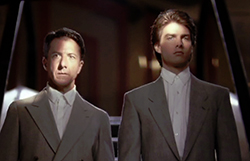 Rain Man wins Academy Award for best picture. The film, produced by Mark Johnson and directed by Barry Levinson, was basically a two-character study, with Dustin Hoffman winning as best actor; while Tom Cruise's performance was widely admired, he was surprisingly not nominated.
Rain Man wins Academy Award for best picture. The film, produced by Mark Johnson and directed by Barry Levinson, was basically a two-character study, with Dustin Hoffman winning as best actor; while Tom Cruise's performance was widely admired, he was surprisingly not nominated.
 Douglas Wilder wins the governorship of Virginia, make him the first African-American to be popularly elected to that office.
Douglas Wilder wins the governorship of Virginia, make him the first African-American to be popularly elected to that office.
 Gen. Colin L. Powell is named chief of the United States Joint Chiefs of Staff, the first African-American in the youngest person (52) to hold the post.
Gen. Colin L. Powell is named chief of the United States Joint Chiefs of Staff, the first African-American in the youngest person (52) to hold the post.
 In March, Frederick Andrew Gregory becomes the first African-American to command a space shuttle when he leads the crew of the Discovery.
In March, Frederick Andrew Gregory becomes the first African-American to command a space shuttle when he leads the crew of the Discovery.
1989
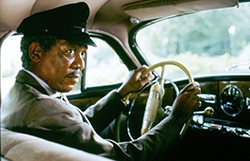 Driving Miss Daisy wins Academy Award for best picture. The film was a rarity, winning the top prize though its director (Bruce Beresford) wasn t even nominated. Among the wins were actress Jessica Tandy and scripter Alfred Uhry, adapting his own play.
Driving Miss Daisy wins Academy Award for best picture. The film was a rarity, winning the top prize though its director (Bruce Beresford) wasn t even nominated. Among the wins were actress Jessica Tandy and scripter Alfred Uhry, adapting his own play.
ESP Quick Facts
ESP Origins
In the early 1990's, Robert Robbins was a faculty member at Johns Hopkins, where he directed the informatics core of GDB — the human gene-mapping database of the international human genome project. To share papers with colleagues around the world, he set up a small paper-sharing section on his personal web page. This small project evolved into The Electronic Scholarly Publishing Project.
ESP Support
In 1995, Robbins became the VP/IT of the Fred Hutchinson Cancer Research Center in Seattle, WA. Soon after arriving in Seattle, Robbins secured funding, through the ELSI component of the US Human Genome Project, to create the original ESP.ORG web site, with the formal goal of providing free, world-wide access to the literature of classical genetics.
ESP Rationale
Although the methods of molecular biology can seem almost magical to the uninitiated, the original techniques of classical genetics are readily appreciated by one and all: cross individuals that differ in some inherited trait, collect all of the progeny, score their attributes, and propose mechanisms to explain the patterns of inheritance observed.
ESP Goal
In reading the early works of classical genetics, one is drawn, almost inexorably, into ever more complex models, until molecular explanations begin to seem both necessary and natural. At that point, the tools for understanding genome research are at hand. Assisting readers reach this point was the original goal of The Electronic Scholarly Publishing Project.
ESP Usage
Usage of the site grew rapidly and has remained high. Faculty began to use the site for their assigned readings. Other on-line publishers, ranging from The New York Times to Nature referenced ESP materials in their own publications. Nobel laureates (e.g., Joshua Lederberg) regularly used the site and even wrote to suggest changes and improvements.
ESP Content
When the site began, no journals were making their early content available in digital format. As a result, ESP was obliged to digitize classic literature before it could be made available. For many important papers — such as Mendel's original paper or the first genetic map — ESP had to produce entirely new typeset versions of the works, if they were to be available in a high-quality format.
ESP Help
Early support from the DOE component of the Human Genome Project was critically important for getting the ESP project on a firm foundation. Since that funding ended (nearly 20 years ago), the project has been operated as a purely volunteer effort. Anyone wishing to assist in these efforts should send an email to Robbins.
ESP Plans
With the development of methods for adding typeset side notes to PDF files, the ESP project now plans to add annotated versions of some classical papers to its holdings. We also plan to add new reference and pedagogical material. We have already started providing regularly updated, comprehensive bibliographies to the ESP.ORG site.
ESP Picks from Around the Web (updated 06 MAR 2017 )
Old Science
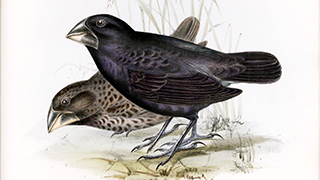
Weird Science
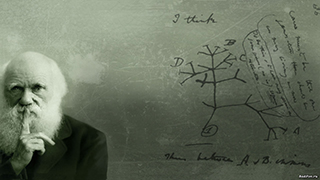
Treating Disease with Fecal Transplantation
Fossils of miniature humans (hobbits) discovered in Indonesia
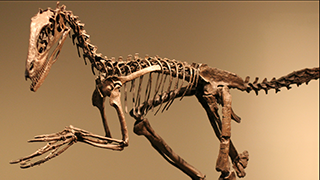
Dinosaur tail, complete with feathers, found preserved in amber.
Astronomy

Mysterious fast radio burst (FRB) detected in the distant universe.